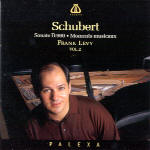Not surprisingly, Volume 2 of Frank Lévy’s Schubertian survey, recorded in the same place (this time without audience) and on the same Fazioli piano, comes with exactly the same qualities and flaws as Volume 1. The pianist’s keen ear for Schubert’s delicate textures, questioning melodies, and intimate moods is somewhat tempered by an edgy, willful approach that prevents the music from fully blossoming into its expressive potential. The B-flat major Sonata abounds in lovely moments, but fails to connect as a whole. Lévy’s tone becomes brutal and heavy-handed in the loudest spots, and his judiciously chosen tempos are not always fully sustained. With their moody, fast changing atmosphere, the six Moments musicaux suit Lévy better, disclosing his inner sensibility and well-shaped singing lines. Here, as in the Sonata, his efforts are not enough to outclass the tough competition. As in Volume 1, the performer’s liner notes are informative and full of insights, whereas the recording has a bright, slightly clangorous quality in the louder dynamics.
































